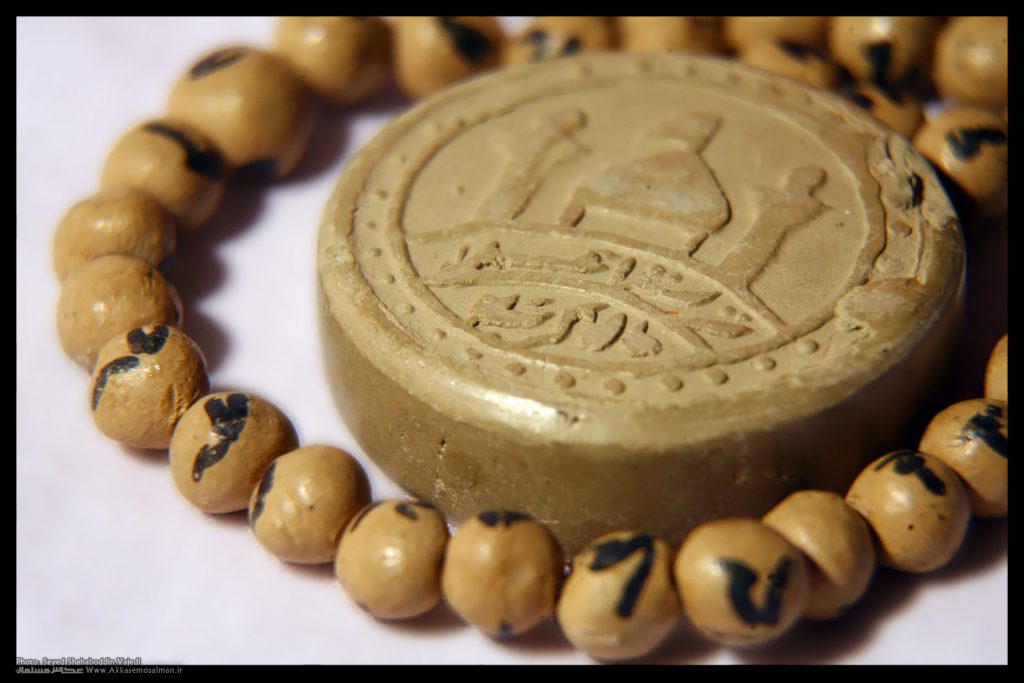
THE EXCELLENCE OF THE CLAY OF KARBALA

While explaining the hidden meaning of prostrating on soil from Karbala,
‘Allamah Amini says, "This issue is based on two basic principles:
a. That the Imamate Shi‘ahs try to always have a clean cake of natural earth in
their possession so that they may prostrate on it.
b. That some graves are superior to others; therefore, there are special
blessings derived from these tombs. It is for this reason that the precincts of
the Ka‘bah and other holy shrines have special religious laws.
One of the lands which has gained superiority over other lands and has become a
source of blessings and favors is Karbala, the place where the body of the Doyen
of Martyrs, Imam al-Husayn (as), lies. Karbala is that same holy piece of land
from which Imam ‘Ali (as), long before the martyrdom of Imam al-Husayn (as), had
picked up a handful of clay. He smelled the soil and cried so much that the soil
got wet with the tears flowing from his eyes.”
Then, he said, "Seventy thousand people will be raised from this land. They will
enter heaven without their actions of this world being accounted.”13
Can it not be said that prostrating on such holy soil is a desirable and
virtuous act? Won’t prostrating on such soil bring about nearness to Allah, the
Exalted? Is it not deserving that man should prostrate on soil which is the
symbol of monotheism and reminds him of the sacrifices which have to be made for
the Beloved, Allah the Exalted?
A piece of soil which, if man looks at it from the perspective that it truly
deserves, brings about tenderness of heart and brings man closer to Allah.14
Professor ‘Abbas Mahmud ‘Aqqad, Egyptian author, says the following about the
land of Karbala,
"The land of Karbala is a holy place where Muslims go for pilgrimage in order to
learn lessons from the example of Imam al-Husayn. For those who are not Muslims,
they come here as tourists to see and visit the holy land.
However, in order for us to do justice to this land, we have to make it a place
of pilgrimage for all inhabitants of the earth so that everyone might gain his
portion of virtue which this land has to offer, regardless of what they believe
in, because we do not have any piece of land in living memory that possesses as
much virtue nor as many benefits as Karbala. The main reason is that this land
called Karbala is the resting place of al-Husayn, and thus is connected and
joined to him.”15
Shaykh Muhammad Husayn Al Kashif al-Ghita’, while explaining why it is
preferable and desirable to prostrate on soil from Karbala, said, "One of the
high motives and aims of preferring to prostrate on soil from Karbala is that
when the person who is praying puts his forehead on this soil, he remembers the
sacrifices that were made by Imam al-Husayn (as) and the love which he displayed
when he was in the presence of Allah.
The man who is praying on the soil from Karbala becomes overwhelmed by such
thoughts as how it is possible for a man to sacrifice as Imam al-Husayn (as) did
for his beliefs and convictions, and stand up against the oppressors!
Considering the fact that prostration is the best posture where a servant of
Allah finds himself in the presence of Allah, it is befitting that while in this
state he remembers holy and pure souls; souls which sacrificed their lives in
the way of their Beloved, Allah. At this moment, and with such thoughts, man
acquires a condition of humility and modesty. Everything that is in this world
will then appear low and abject before him.
With such thoughts, man’s soul acquires a strong mystical and spiritual
attachment to Allah, like the station of conviction which was attained by Imam
al-Husayn (as) and his companions. This is the benefit of betaking a strong
connection with Imam al-Husayn (as) by means of prostrating on soil from
Karbala.
It is for this reason that we read in narrations about Imam al-Husayn (as) that
his clay (the soil of Karbala) removes the seven veils [hijab]. Therefore, in
reality, prostration on the soil of Karbala is a secret for ascending from the
earthly domain towards the Lord of lords…”16
‘Abd al-Razzaq Muqarram writes, "One of the methods that the Ahl al-Bayt (as)
have employed to manifest the oppression which Imam al-Husayn (as) suffered is
prostrating on soil from Karbala. This action has lots of hidden meanings.
The most important secret is that every time man’s eyes fall on the soil of
Karbala as he performs his five daily prayers, he is reminded about Imam al-Husayn
(as) and his companions and the sacrifices they made. It is clear that
remembering such role models will produce remarkable psychological and spiritual
effects in man’s soul…”17
Notes:
13. Al-Mu‘jam al-Kabir, vol. 3, p. 111, hadith 2825.
14. Al-Sujud ‘ala al-Turbat al-Husayniyyah ‘inda al-Shi‘ah al-Imamiyyah, pp.
69-87.
15. Abu al-Shuhada, p. 145.
16. Al-Ard wa al-Turbat al-Husayniyyah, pp. 32-33.
17. Maqtal al-Husayn (as), pp. 103-104.
Adapted from: "The Uprising of Ashura and Responses to Doubts” by: "‘Ali Asghar
Ridwani”
Source: SHAFAQNA















